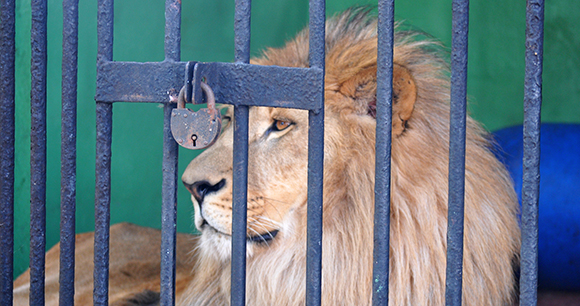
Bill seeks to thwart next “Tiger King”
Washington, DC—The Animal Welfare Institute commends today’s reintroduction of the Big Cat Public Safety Act in the US Senate. Championed by Senators Richard Blumenthal (D-CT), Susan Collins (R-ME), Tom Carper (D-DE), and Richard Burr (R-NC), the bill would prohibit cruel activities associated with the big cat trade.
Last year, in the wake of the Netflix docuseries “Tiger King” and heightened public attention to the exploitation of captive big cats, the legislation passed the US House of Representatives by a strong bipartisan majority. However, it was not taken up by the Senate before the 116th Congress closed. In January, the bill (H.R. 151) was reintroduced in the House, where it awaits another vote.
The Big Cat Public Safety Act would prohibit private individuals from possessing lions, tigers, leopards, cheetahs, jaguars, cougars, or any hybrid of these species. This prohibition would only apply to big cats kept as pets; sanctuaries, universities, and zoos would be exempt.
Additionally, the bill would prohibit public petting, playing with, feeding, and photo ops with cubs. Breeders often separate mother cats from their cubs immediately after birth, leading to physical and psychological harm as it interrupts the mother-cub bonding process and taxes cubs’ underdeveloped immune systems. It is stressful and frightening for the cubs to be passed around in crowds of people, and the handlers often physically abuse them to force them to “behave.” The profit derived from encouraging the public to handle and pose with cubs is the primary driver of surplus tigers flooding the exotic animal trade in the United States and results in untold numbers of animals being subjected to trauma and abuse.
Big cats kept as pets pose a tremendous danger to the surrounding community and to first responders. As a result, the Big Cat Public Safety Act has been endorsed by a large number of law enforcement organizations and officers. Several recent incidents in Texas involving tigers kept on private property are among hundreds of similar examples nationwide that underscore the hazards posed by pet big cats, who are often neglected.
“It is a travesty that no one has any idea how many big cats are kept in captivity across the United States or where they’re even located,” said Cathy Liss, president of AWI. “Big cats suffer neglect and abuse at the hands of people who are unqualified to own them, and they pose a threat to public health and safety. The Animal Welfare Institute looks forward to working with the bipartisan sponsors of the Big Cat Public Safety Act to keep our communities safe and promote the humane treatment of these animals.”
“This bipartisan measure would help stop exploitation of big cats like tigers and lions, and reduce safety risks,” said Blumenthal. “My Big Cat Public Safety Act would prohibit private ownership of these beautiful but powerful predators, which deserve to live in the wild. They should never be pets, even as cubs, kept in captivity dangerously for entertainment. I’m thankful for the groundswell of public support for this bill and look forward to working with my colleagues from both sides of the aisle to ensure it becomes law.”
“Big cats like lions, tigers, and cheetahs belong in their natural habitats, not in the hands of private owners where they are too often subject to cruelty or improper care,” said Collins. “Our bipartisan bill would prohibit the private ownership of big cats, which threatens the safety of the animals and the public and harms conservation efforts. I have long advocated for policies that improve the welfare of animals, and I urge my colleagues to join me in supporting this legislation.”
Margie Fishman, (202) 446-2128, [email protected]